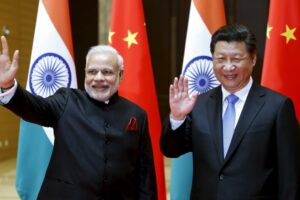Charanjot Singh plays football professionally, only he doesn’t wear a pair of boots and run around on a pitch.
The 20-year-old instead earns a living playing football computer games, including the tournaments organised by the electronic sports (esports) division of football world governing body Fifa.
Back in June, Mr Singh represented India in Fifa Esports’ Nations Cup 2023. This was held in Saudi Arabia, and Mr Singh says he came 64th. According to one report, this earned him $10,000 (£8,000).
“I have no idea if I’m good or not, I just enjoy playing,” he says.
Mr Singh, who is from the city of Chandigarh, in northern India, is indicative of a country that increasingly really likes computer games.
Last year, there were 421 million people in India who played online games, according to a report in April by accountancy group Ernst & Young. This was up from 300 million in 2019, and the number is expected to rise to 442 million this year.
The study also said that the combined revenues of online games in India were 135bn Indian rupees ($1.6bn; £1.30bn) in 2022, 22% higher than in 2021. And it predicted that annual growth will continue around this level.
At the same time, a separate report said that the number of Indians participating in organised esports competitions had soared from 150,000 in 2021, to 600,000 in 2022.
This big growth is said to have been fuelled by the coronavirus lockdowns giving people more leisure time, and the increased availability of affordable smartphones and cheap internet data packs – 90% of Indian gamers use their phones rather than a computer or games console.
While only an estimated 20% of online games played in India are currently made by Indian gaming firms, the homegrown sector has been growing quickly in recent years. And there are now more than 900 Indian gaming start-ups.
Yet while all had been looking good, shockwaves were sent through the industry back in July when the government announced that it was inducing a new 28% tax on online gaming. Such was the vagueness of the wording that the fear was that it could affect all Indian gaming firms.
However, New Delhi subsequently clarified that the tax, which starts next month, will only apply to so-called “iGaming”. These are gambling sites, such as online casinos; or “real money” games in which the players have to pay to enter, and then compete to win prize money, such as some fantasy cricket competitions.
The tax does not apply to esports competitions, which are classified as a genuine sport. And while such competitions offer prize funds, you do not have to pay to take part. The prize money instead is covered by sponsorship and people paying to watch the games.
Nor does the new tax affect casual gaming, such as games in which the user may have to pay to participate, or then make in-app purchases to be able to continue. This is because these games do not offer any prize funds.
Source : BBC
















